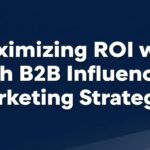In the modern B2B landscape, B2B Influencer Marketing is evolving into a powerful tool for driving engagement, authority, and revenue. Collaborating with thought leaders enables brands to reach key decision-makers, communicate complex solutions effectively, and foster trust among target audiences.
Maximizing ROI from influencer campaigns requires strategic planning, performance measurement, and authentic collaborations. Organizations that master these elements gain competitive advantage and accelerate business growth.
Defining Goals for Influencer Campaigns
The foundation of any successful B2B influencer marketing initiative is clearly defined goals. Whether the objective is to generate leads, build brand authority, or increase event attendance, having specific outcomes guides strategy and measurement.
Setting measurable KPIs, such as engagement rates, lead quality, content downloads, or webinar participation, ensures campaigns remain focused and ROI can be effectively tracked.
Identifying Industry Thought Leaders
Identifying the right influencers is critical for campaign success. Influencers should have relevant expertise, a strong industry presence, and engaged audiences that align with your target market.
Micro-influencers and niche experts often provide higher engagement with key decision-makers, making them valuable partners for specialized campaigns. Analytics tools can assist in evaluating influencer reach, credibility, and relevance.
Crafting Authentic Collaborations
Authenticity drives engagement in B2B influencer marketing. Brands should co-create content with thought leaders rather than simply sponsoring posts or promotions.
Jointly producing webinars, articles, podcasts, and research reports ensures the content is insightful, relevant, and credible. Authentic collaboration strengthens trust with audiences and enhances campaign effectiveness.
Content Strategies for Higher Engagement
Content remains central to B2B influencer marketing success. Co-created content can include in-depth whitepapers, case studies, interactive webinars, and videos, providing value while highlighting both the influencer and brand.
Content should be tailored to the preferences and challenges of your target audience. Understanding which formats resonate with different stakeholders ensures maximum engagement and a higher likelihood of lead conversion.
Amplifying Reach Through Social Media
Social media is a critical channel for distributing influencer-driven content. Platforms like LinkedIn, Twitter, and industry-specific forums allow thought leaders to engage their audiences directly.
Interactive formats such as polls, live Q&A sessions, and short educational videos can increase engagement and stimulate discussions, driving awareness and credibility for your brand.
Leveraging Influencers for ABM Campaigns
Account-Based Marketing (ABM) benefits significantly from influencer marketing. Thought leaders can amplify messages to key accounts, influencing multiple stakeholders and reinforcing brand credibility at pivotal points in the buying journey.
By integrating influencer content with ABM initiatives, marketers can deliver personalized messages, nurture relationships with high-value prospects, and accelerate pipeline growth.
Measuring Performance and ROI
Tracking campaign effectiveness requires a focus on both quantitative and qualitative metrics. Engagement, content downloads, lead quality, sales influenced, and webinar attendance are essential indicators of success.
Regularly analyzing these metrics allows marketers to refine strategies, optimize influencer collaborations, and ensure marketing budgets are efficiently utilized for maximum ROI.
Overcoming Challenges in B2B Influencer Marketing
B2B influencer marketing presents unique challenges. Identifying credible influencers, aligning messaging with brand objectives, and maintaining content authenticity are common hurdles.
Implementing clear guidelines, fostering transparent communication, and establishing long-term partnerships mitigates these challenges while ensuring campaigns remain effective and credible.
Emerging Trends in 2025
The landscape of B2B influencer marketing is rapidly evolving. Key trends include:
-
Greater reliance on micro-influencers with niche expertise.
-
Integration of influencer campaigns with AI-driven personalization.
-
Expansion of interactive formats such as webinars, podcasts, and live sessions.
-
Focus on long-term influencer relationships over one-off campaigns.
-
Advanced analytics and attribution models to measure impact more precisely.
Brands that embrace these trends can maintain a competitive edge, enhance engagement, and optimize their influencer marketing ROI.
Scaling B2B Influencer Marketing Programs
Scaling influencer marketing initiatives requires structured programs, including a curated database of potential influencers, repeatable workflows for content creation, and continuous performance monitoring.
Technology solutions for influencer discovery, campaign management, and analytics help streamline operations and ensure campaigns remain effective, even at scale.
Read the Full Blog: https://acceligize.com/featured-blogs/the-future-of-b2b-influencer-marketing-driving-growth-with-thought-leaders/
About Us
Acceligize is a leading global partner in B2B demand generation and marketing, empowering businesses to achieve scalable, data-driven growth. By leveraging advanced technologies such as Conversational AI and intelligent chatbots, we help brands connect with the right prospects, build meaningful relationships, and accelerate lead conversions.
Our approach combines personalization, automation, and actionable insights to ensure every marketing effort delivers measurable outcomes. Backed by a team of expert marketers and robust technology infrastructure, Acceligize transforms marketing outreach into real business impact redefining growth potential in today’s competitive B2B landscape.

